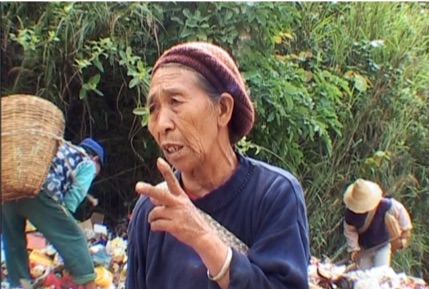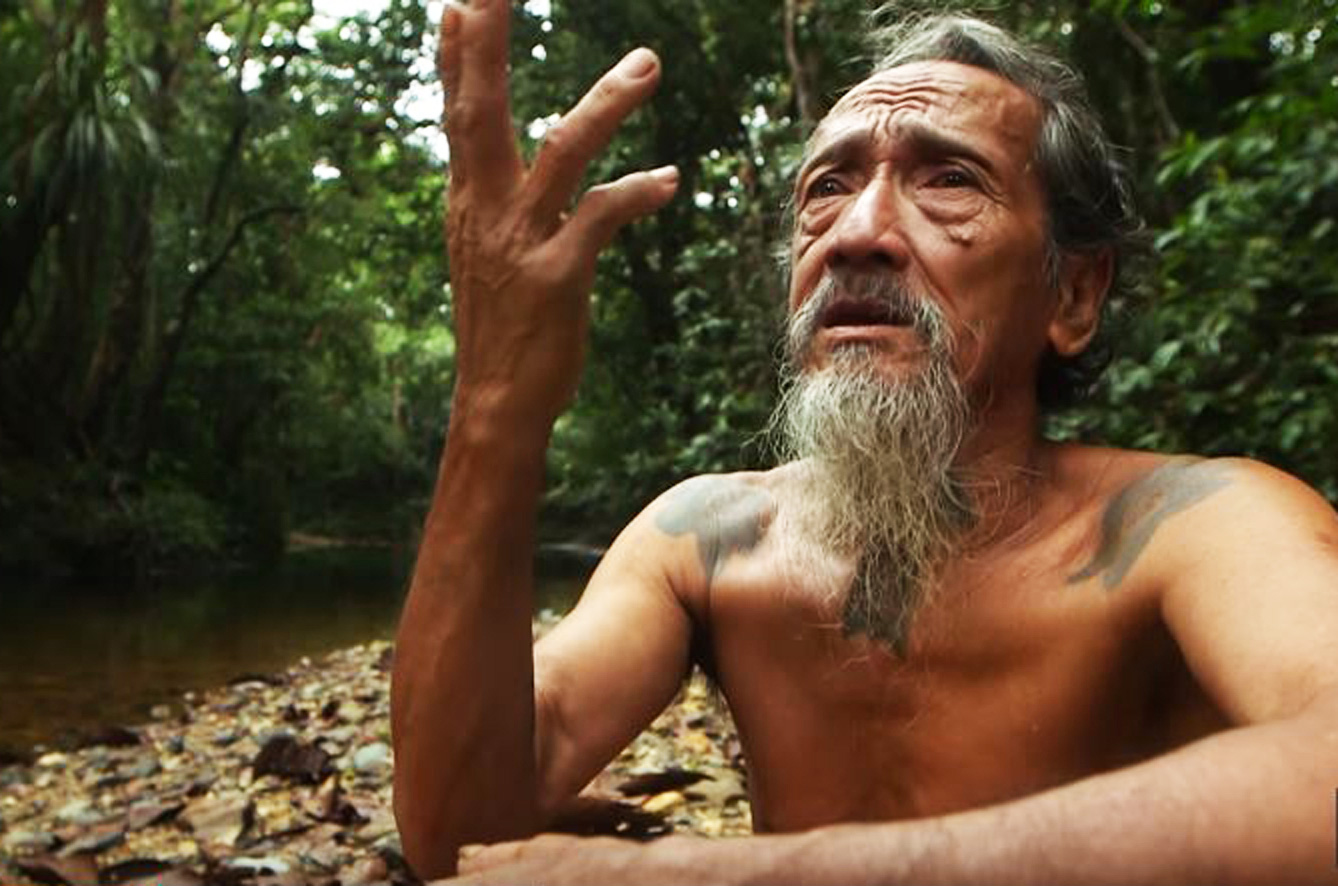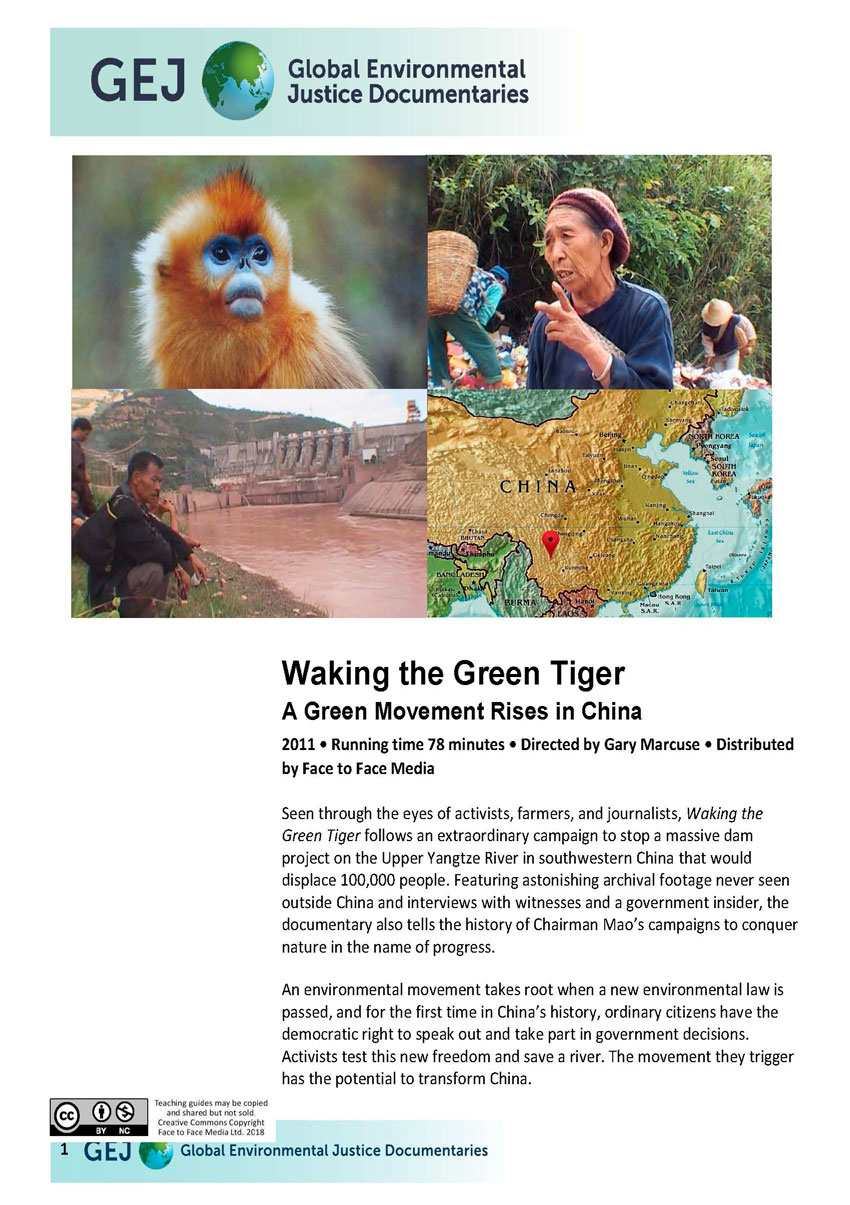Curator
 — Ken Berthel, Assistant Professor of Chinese, Whittier College
— Ken Berthel, Assistant Professor of Chinese, Whittier College
Waking the Green Tiger
Seen through the eyes of activists, farmers, and journalists, Waking the Green Tiger follows an extraordinary, unprecedented, and successful campaign to stop a huge dam project on the upper Yangtze river in the high mountains of southwestern China.

Curator
This film was chosen by Ken Berthel, Assistant Professor of Chinese, Whittier College
Why I selected this film
Waking the Green Tiger frames the unprecedented success of a grassroots environmental movement as a pivotal moment in the context of the detrimental environmental practices of the recent past, suggesting that this success might represent a foothold for a more burgeoning democratic movement. The film can serve as an excellent jumping-off point for a number of important topics, including environmental justice, political activism, Chinese environmental history, and the power of documentary filmmaking.
Marcuse’s film will appeal to educators who wish to focus on environmental justice, tensions between rising demands for energy and environmental protection, and the power of grassroots movements to effect unexpected outcomes in political contexts as challenging as the one in contemporary China. Waking the Green Tiger will be relevant for courses in environmental studies, Chinese cultural studies, sociology, anthropology, political science, law, and film, among others.
Teacher's guide
Please see the teacher's guide for maps, background information and suggested subjects, questions and activities.
Synopsis
Seen through the eyes of activists, farmers, and journalists, Waking the Green Tiger follows an extraordinary campaign to stop a massive dam project on the Upper Yangtze River in southwestern China that would displace 100,000 people.
Featuring astonishing archival footage never seen outside China and interviews with witnesses and a government insider, the documentary also tells the history of Chairman Mao’s campaigns to conquer nature in the name of progress.
An environmental movement takes root when a new environmental law is passed, and for the first time in China’s history, ordinary citizens have the democratic right to speak out and take part in government decisions. Activists test this new freedom and save a river. The movement they trigger has the potential to transform China.
The environmental justice focus of the film
The film deals with questions of individual and local group agency over the environmental conditions in which they live, with reference to associated tensions that arise among farmers, non-governmental organizations,hydroelectric power profiteers, and government agencies.
Updates
October 2020: For an update on the current status of dam construction and the obstacles faced by NGOs on the upper Yangtze see
https://e360.yale.edu/features/with-activists-silenced-china-moves-ahead-on-big-dam-project
Waking the Green Tiger is wonderful, an amazing story that opens an unexpected window onto China. - Ronald Wright, author of A Short History of Progress
…the perfect balance between information and entertainment, condensing several decades of history into a rousing portrait of China’s emerging green movement. — Brett Kessler, ABC 7.com
Review for Video Librarian by Isadora Lambert
https://videolibrarian.com/reviews/documentary/waking-the-green-tiger-documentary/
Four stars ****
This film would be especially impactful to students and library patrons interested in topics like environmental justice, history, Asian studies, geography, political science, and anthropology.
Waking the Green Tiger: A Green Movement Rises in China is an interesting documentary that examines the unique environmental situation in China. The film follows activist opposition to the construction of twenty-one dams along the three rivers in the Yunnan Provence. These dams infringe upon the unique biodiversity and traditional farming practices in the Yunnan Provence. More than half of the plant and animal species in China can be found in this area, including rare golden monkeys. These dams would also force thousands of farmers to lose their land.
Waking the Green Tiger does an excellent job of explaining the history of environmental destruction in China caused by the regime of Chairman Mao. Mao’s “Man Must Conqueror Nature” campaign prioritized industrial development, encouraging the destruction of forests to make way for steel production. This campaign also encouraged the destruction of pests, urging citizens to kill sparrows that ate grain. However, without the sparrows to kill insects that also ate the grain, the crops failed and millions of people died of famine. This fascinating history is bolstered with archival footage and propaganda posters.
In 2004, a group of activists gained national attention and started a new age of green activism in China. The passage of the New Environmental Assessment Law allowed citizens the right to discuss and question the environmental impact of industrial development. Waking the Green Tiger follows the plight of activists enacting their right to challenge the government.
The documentary presents testimonies from several key figures in the environmental movement, including Qu Geping, China’s former director of environmental protection. Activists, journalists, and farmers are also interviewed, presenting a well-rounded portrait of the environmental movement. The film is shown through the perspective of these activists, placing the viewer inside their world. This viewpoint is often unseen, as censorship laws in China previously prevented documentaries like this from being made.
Waking the Green Tiger captures the spirit of the grassroot environmental movement, emphasizing both how much progress has been made and the work that remains to be done to protect China’s natural environments.
What academic library shelves would this title be on?
This film would be especially impactful to students and library patrons interested in topics like environmental justice, history, Asian studies, geography, political science, and anthropology.
How does this film contribute to a discussion of environmental or climate justice, and/or to environmental literacy?
Waking the Green Tiger contributes to discussions of environmental literacy by showing how the actions of everyday people can impact the environmental health of a nation.
Can this film be used in a library education program?
The film is available in a full-length 78-minute version along with a teacher’s guide. Global Environmental Justice also provides 18 minutes of selected excerpts that would be ideal for a library education program.
Awards
Ifeng Green China Film Award 2013
Award of Merit for Environmental Journalism Cinema for Peace, Berlin
Finalist, International Green Film Award
Shanghai International Film Festival
Official Selection
Planet in Focus
Best Canadian Feature Documentary
Writer’s Guild of Canada, 2012 Canadian Screenwriting Awards
Best Documentary
Spokane International FF Jury Award
Silver SpIFFy, Documentary Category
Rio de Janeiro filmambiente 2012 International Festival of Environmental Films
Special Award for films about the importance of learning from mistakes and the power of society
Journalistic Relevance Award from the Brazilian Network of Environmental Journalists.
Colorado Environmental Film Festival Best of Festival 2013
Vancouver International Film Festival
Audience Recognition: Top Ten Canadian Films Award
The Grantham Prize Honoring exceptional environmental journalism
2012 Award of Special Merit Recipients Gary Marcuse, Betsy Carson, & Shi Lihong
Citation
Main credits
Marcuse, Gary (film director)
Marcuse, Gary (film producer)
Marcuse, Gary (screenwriter)
Carson, Betsy (film producer)
Hewlett, David (narrator)
Other credits
Editor, Stuart De Jong; cinematographer, Rolf Cutts; composers, Henry Heillig, Doug Wilde; consultant, Judith Shapiro.
Distributor credits
Betsy Carson and Gary Marcuse
Gary Marcuse
Location Sound
GARY MARCUSE
Sound Supervisor /Mixer
EWAN DEANE
Production Management Services
LIXIN FAN PRODUCTIONS
Second Unit Director
SHI LIHONG
Docuseek subjects
Environmental Justice
Asian Studies
History
Anthropology and Archaeology
Politics and Political Science
Geography
Water
Rivers and Lakes
Asia
Dams and Hydroelectricity
Energy
Government Policy
Communication and Media Studies
Journalism and the Press
Agriculture and Food
Manufacturing
Citizenship, Social Movements and Activism
Human Rights
Farming
Food
Global / International Studies
Film and Video Studies
Indigenous Studies
Biodiversity
Hydroelectric
Environmentalists
Habitat Destruction
Pollution
Resource Planning and Management
Ethics
Ecology
East Asia
Women's Studies
Environmental Geography
Religion and Spirituality
Endangered Species and Extinction
Distributor subjects
Animals
Animal Rights
Asian Studies
Biodiversity
China
Communication and Media Studies
Conflict Resolution
Dams
Democracy
Economics
ecosystem restoration
Ecosystems
Environmental Anthropology
Environmental Geography
Environmental History
Environmental Justice
Environmental Law
Ethics
Farming
Film and Video Studies
Food
Forestry
Forests
Gender Studies
Grasslands and Prairies
Habitat Loss
History
Human Rights
Human Rights Law
Indigenous Studies
Journalism
Manufacturing
Political Ecology
Pollution
Publichealth
Religion
Revolution
Rivers
Solutions
Sustainability
Water
Wetlands
Keywords
Welcome to Docuseek2!
Docuseek2 is a streaming platform of the best documentary and social issue films available for the higher education community.
Anyone may search for titles and find detailed information about the titles. To preview films or license them for streaming, you must register and login.
Currently, we support online registration for anyone affiliated with a higher education institution. Please inquire if you are with a K-12 district or school or with a public library.
Click the Close button to get started!



